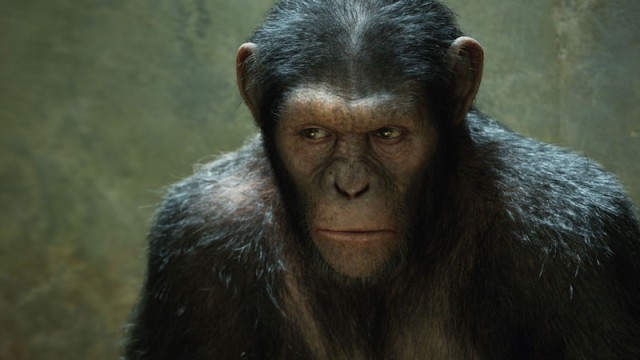Review: Rise of the Planet of the Apes
The one thing that always made the “Planet of the Apes” a bit campy was actors in make up and monkey suits. So in one instance, here’s where technology, specifically the use motion-capture technology as seen in “Avatar,” can almost single-handedly justify revisiting an old franchise. But the apes of “Rise of the Planet of the Apes” don’t just look amazing — they have souls. So does this script, which delivers one of the summer’s biggest surprises in terms of pure entertainment and depth of storytelling.
Unlike the “Transformers” franchise, where giant steel-crushing robots have gotten lost in inane plots driven by pointless human characters, “Rise” keeps the primates as an almost exclusive focus. Somewhere close to the midpoint, humans even take a back seat to the captivating ape-centered story arcs crafted by writers Rick Jaffa and Amanda Silver. Not only do apes most definitely rise in this movie, but they also do so with clear tremendous purpose. The story of how a potential cure for Alzheimer’s went out of control couldn’t be more crystal clear, as is the reasoning that inspires an ape named Caesar to incite a rebellion.
James Franco plays scientist Will Rodman, who’s experimenting with his Alzheimer’s cure on apes. His most recent tests show incredible cognitive abilities in one ape and so he makes a presentation to the company’s board asking for permission to test the drug on humans. Things go wrong during the presentation, however, when the ape goes, well — ape — and on display for the whole lab. The apes are ordered to be put down and Franco’s entire operation gets shut down.
However, the trial ape had been hiding a newborn baby. Will secretly takes it home where his father (John Lithgow) suffers from Alzheimer’s. Turns out the chimp, which his father names Caesar, inherited the cognitive abilities of the drug through its mother. As Caesar grows and exhibits tremendous mental growth (including helping Will land an otherwise pointless girlfriend in Freida Pinto), Will desperately tests the drug on his father and suddenly he has hope for the project to continue.
This origin story plays out for most of the film, but Caesar ends up becoming the focus. Although he says nothing, he generates incredible sympathy through consummate mo-cap actor Andy Serkis (Gollum in “The Lord of the Rings”). Add to that the burgeoning scientific moral dilemma and “Rise” builds quite the captivating story. The turning points for Caesar that result in and arise from his inhumane captivity all wield the impact that pivotal moments should carry in all films. Despite a story that originated almost 45 years ago, the script lays this perfect and scientifically reasonable foundation for the “Planet of the Apes” we already know. The only thing that feels like a reach is the speed with which the apes develop certain tactical abilities once they all receive the drug.
Director Rupert Wyatt definitely understands the script handed to him as he provides the appropriate magnitude to these effective plot points and knows how to create mouth-agape moments. When David Oyewolo’s character (Will’s supervisor at the drug company) arrives at the lab cafeteria to find a bunch of tables overturned, Wyatt pans up to reveal he’s surrounded by apes. There’s no reason to think they weren’t there waiting for him, but we’re caught off guard just long enough to know he better make a run for it. Those are the “glory shots” that make a true blockbuster.
Much of the action used to promote the movie comes in the film’s final act, which uses all the slowly building tension from scenes showing cruelty toward the apes in the second act to fuel the fire. With such strong motivation accumulated during these first two chunks of the film, the action doesn’t have to be that explosive or visceral in order to be effective. Apes tearing humans limb for limb would have certainly made for a more interesting film to say the least, but “Rise” manages to get away with the tamer action due to all the powerful setup and Wyatt provokes some imagination-inspired gore. In addition, the fact that the apes just knock people unconscious serves the script’s efforts to show how — just like humans — some apes are violent and evil in nature while some are sympathetic and merciful. The film expertly muddles our perception of who to root for in this sense.
Considering prequels inherently risk their quality on the fact that we know the end result, it’s impressive that “Rise of the Planet of the Apes” maintains our interest consistently throughout. The ending does leave something to be desired because it ends just as the battle between apes and humans seems to be going somewhere, but even though I’m not sure what would happen (or what the title would be for that matter), if the sequel picks up right where this left off — count me in.
—
4/5 Stars
—
Rise of the Planet of the Apes
Directed by Rupert Wyatt
Written by Rick Jaffa and Amanda Silver, Pierre Boulle (original novel)
Starring: James Franco, Andy Serkis, Freida Pinto, John Lithgow





0 Comments
You can be the first one to leave a comment.